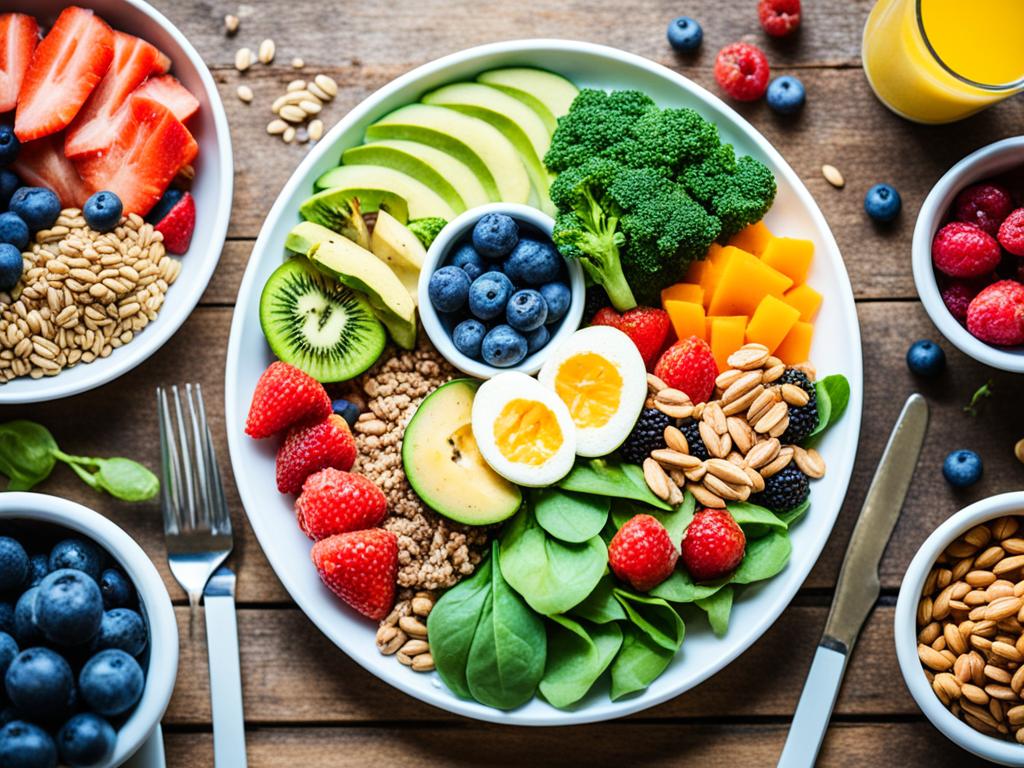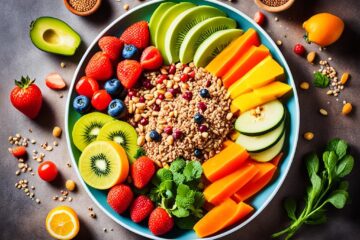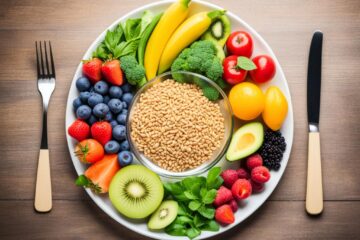As someone who loves sports, I’m always amazed by how food can make a huge difference. The right diet can give you more strength, help you last longer, and recover quicker. This sports nutrition guide is here to help everyone, from beginners to seasoned athletes, get the most out of their bodies.
We’re going to explore why nutrition for athletes is so important. You’ll learn about macronutrients and micronutrients your body needs and how to hydrate properly. We’ll also touch on sports supplements and their benefits. With this knowledge, you can create a diet that boosts your performance in training and on competition days.
Key Takeaways
- Proper nutrition is key for sports, giving your body the right fuel and tools to recover.
- The right diet depends on your sport’s needs, like stamina, strength, or teamwork.
- Carbs, proteins, and fats are vital for energy, muscle health, and your overall wellness.
- Micronutrients, such as vitamins, minerals, and antioxidants, help your body work better and recover faster.
- Drinking right and eating at the best times before and after working out can change your game.
The Importance of Proper Nutrition for Athletes
For athletes, eating right is key to performing at their best. Good food acts as fuel, helps build the body, and supports recovery. This allows athletes to shine in training, competition, and when they rest. When athletes eat well, they boost both their physical and mental game. The end result? Better performance all around.
Fueling Your Body for Peak Performance
Nutrition is critical for any athlete. Carbs, proteins, and fats are like the three musketeers for your body. Carbs give you needed energy, proteins rebuild your muscles, and fats keep you going. Timing when you eat these nutrients is also vital. It ensures your body has what it needs to perform at its peak.
Understanding the Nutritional Needs of Different Sports
The food an athlete needs changes with their sport. Those in endurance sports benefit from a big carb intake. It helps keep their energy up over long spells. For athletes focusing on strength, getting enough protein is key. It helps their muscles grow and recover. Team sport players have a mix of needs, requiring energy for quick moments and longer plays. Knowing what their sport demands lets athletes shape their eating plans for the best results.
Macronutrients for Athletes: Carbohydrates, Proteins, and Fats
Athletes need to know how important carbohydrates, proteins, and fats are. These macronutrients help fuel the body, build and repair muscle, and keep you healthy.
The Role of Carbohydrates in Athletic Performance
Carbohydrates are the body’s main energy source. They are key for performance during exercise. They give muscles the glucose needed for hard efforts.
Eating enough carbs helps keep up endurance and fights fatigue. It also helps the body recover after exercise by refilling glycogen stores.
Protein: Building and Repairing Muscle Tissue
Protein is crucial for building and fixing muscles. The right amount and type of protein aid growth, repair, and recovery. It’s also important for immune and bone health.
Even though carbs and protein get most sports nutrition focus, fats are essential for athletes too. They offer steady energy, help make hormones, and boost health. Choosing healthy fats from nuts, seeds, avocados, and fish can help athletes thrive.
| Macronutrient | Key Functions for Athletes | Best Sources |
|---|---|---|
| Carbohydrates | Primary fuel source for high-intensity exercise, supports endurance, replenishes glycogen stores | Whole grains, fruits, vegetables, legumes, sports drinks |
| Protein | Builds and repairs muscle tissue, supports immune function, aids in recovery | Lean meats, poultry, fish, eggs, dairy, plant-based proteins |
| Fats | Slow-burning energy source, supports hormone production, contributes to overall health | Nuts, seeds, avocados, olive oil, fatty fish |
Knowing about carbohydrates, proteins, and fats helps athletes plan better. They can create a good macronutrient strategy to boost their performance, recovery, and health.
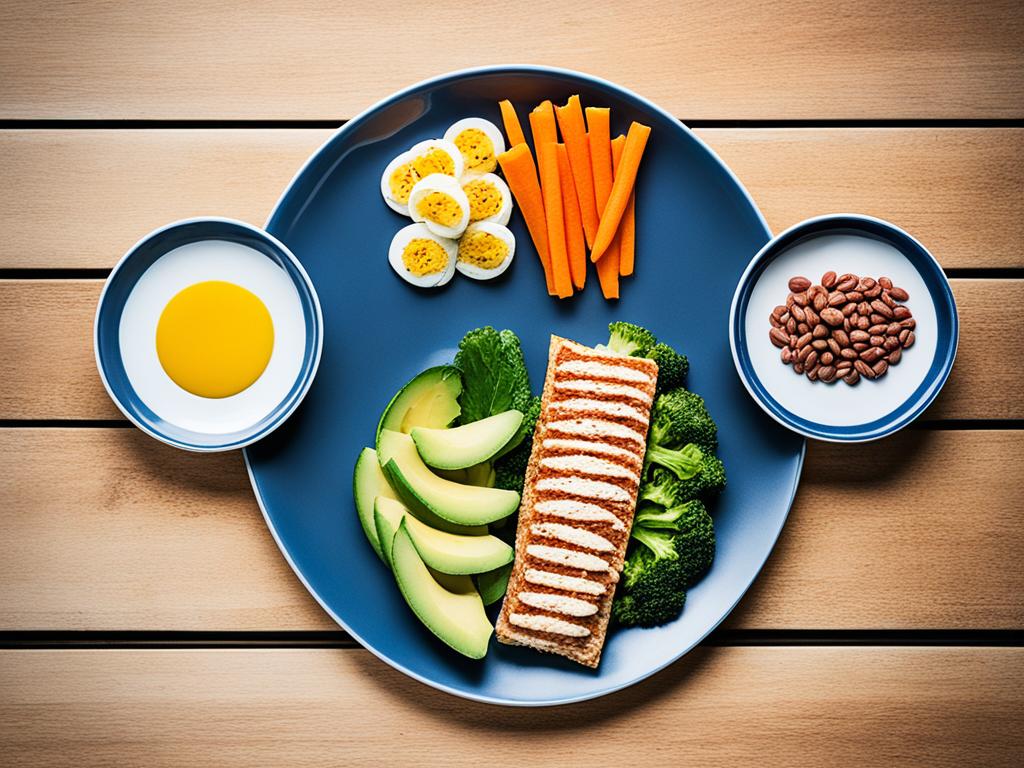
Alimentation et performance sportive: Comment optimiser vos résultats
Giving athletes the right food is crucial for them to be their best. This part looks into the top strategies and rules to help athletes get better results. It also shows how good nutrition can make their sports performance better.
The key to good sports nutrition is balancing the big three: carbs, proteins, and fats. Athletes can power up their bodies for better training, recovery, and when competing. They do this by figuring out their personal needs and making plans that work for them. This part gives a detailed look at how to use nutrition to do better in sports.
Also, this section talks about the right time to eat certain foods for training, competing, and recovering. With a good plan for what to eat before, during, and after exercise, athletes can improve. They can get the most out of their food and do better in their sport.
This part also talks about how important vitamins and minerals are for athletes. Eating a variety of nutrient-rich foods helps athletes do well and stay healthy. It’s about giving your body what it needs to perform at its best.
For anyone who loves sports, the advice in this section can really help. It shows how to use nutrition to perform your best in any sport.
| Nutrition Strategies for Optimizing Athletic Performance | Key Benefits |
|---|---|
| Balanced Macronutrient Intake | Fuels the body for enhanced training, recovery, and competition |
| Individualized Nutrition Planning | Tailors nutrition to the specific needs of the athlete and their sport |
| Strategic Nutrient Timing | Ensures the right nutrients are consumed at the optimal times for performance and recovery |
| Incorporation of Essential Micronutrients | Supports overall athletic function and recovery |
Following these nutrition strategies for athletes will help anyone reach their full potential. It’s a smart and proven way to use food for better sports performance.
Essential Micronutrients for Athletes
Macronutrients like carbs, proteins, and fats are crucial for sports. But, we must not forget about micronutrients. These are vitamins and minerals, key for health and performance.
Vitamins and Minerals: Supporting Optimal Function
Athletes need vitamins and minerals to stay at their best. These nutrients help with energy, muscle repair, and keeping the immune system strong. They are vital for succeeding in sports.
For instance, vitamin B complex turns food into energy. Iron moves oxygen in the body. Calcium and vitamin D keep bones strong to prevent injuries. Getting enough of these vitamins and minerals can improve an athlete’s performance.
Antioxidants: Combating Exercise-Induced Oxidative Stress
Antioxidants are essential for athletes facing exercise-induced oxidative stress. This stress comes from intense workouts. It can harm cells and slow down recovery.
Antioxidants like vitamins C and E fight these harmful effects. They protect the body, helping athletes recover better. Adding antioxidant-rich foods or supplements to their diets can boost an athlete’s performance.
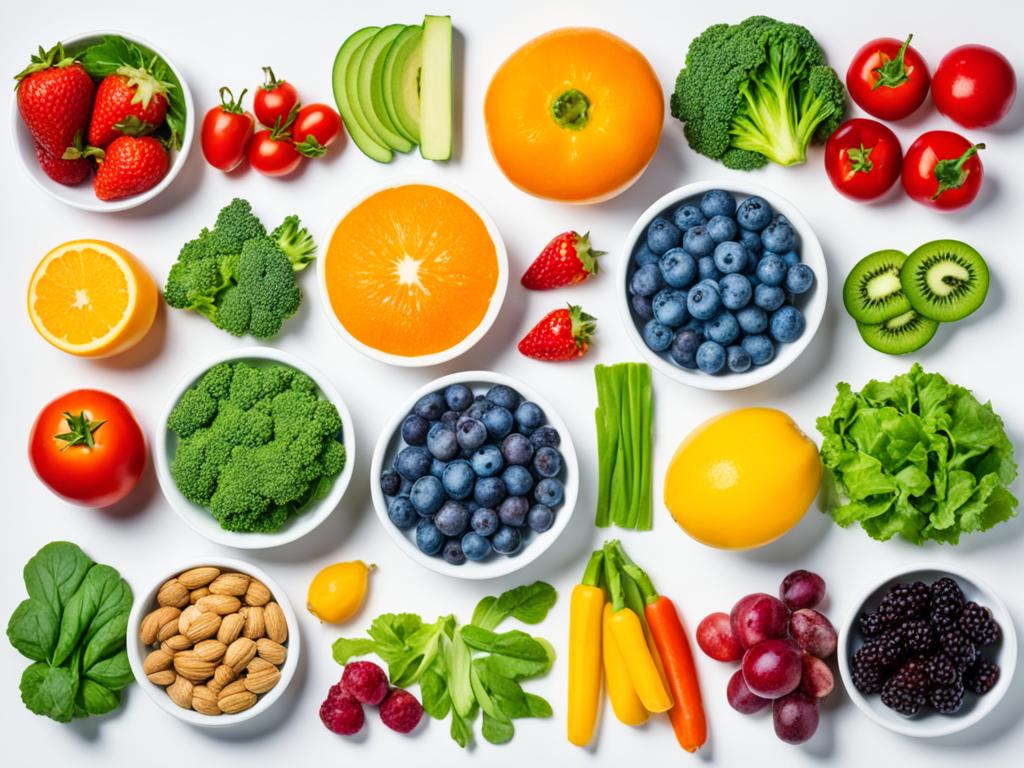
Hydration Strategies for Athletes
Being properly hydrated is key for athletes to perform at their best. Athletes need more water and electrolytes when training or competing. Choosing the right hydration strategies is critical to staying in top shape, both physically and mentally.
The Importance of Staying Hydrated During Training and Competition
Dehydration can really hurt an athlete’s performance and well-being. It lowers endurance, strength, and makes you tired. Yet, being well hydrated during activities keeps your energy up, helps in muscle recovery, and keeps your temperature steady.
| Hydration Benefits for Athletes | Consequences of Dehydration |
|---|---|
|
|
Athletes should have a plan to stay hydrated properly. This plan should fit their sweat rates, training or competition details, and the weather.
“Proper hydration is not just about drinking water – it’s about replenishing the essential electrolytes your body needs to function at its best.”
Having good hydration strategies is crucial. It helps athletes keep a balanced hydration during activities. This leads to better stamina, faster recovery, and superior athletic feats.
Pre-Workout Nutrition: Fueling Up for Success
For athletes to do their best, getting the right pre-workout nutrition is key. By choosing the right foods and the best time to eat, you give your body what it needs. This helps you have the energy, focus, and strength to meet any challenge.
Timing Your Pre-Workout Meal or Snack
When you eat before working out matters a lot. Try to eat 30-60 minutes before your session. This meal or snack should have carbs, proteins, and healthy fats. Doing this helps your body get a constant flow of energy. It also aids in muscle repair after you’re done.
Optimal Pre-Workout Nutrition Choices
For the best pre-workout foods, pick what’s easy on the stomach. Look for things that give you quick energy and sustain it, too. Here are some good choices:
- Whole grain toast with almond butter and sliced banana
- Greek yogurt with berries and a sprinkle of granola
- Oatmeal with chia seeds and a drizzle of honey
- A smoothie made with fruit, leafy greens, and a protein powder
These foods are packed with the carbs, proteins, and fats your body needs. They will help you get through your workout and recover well.
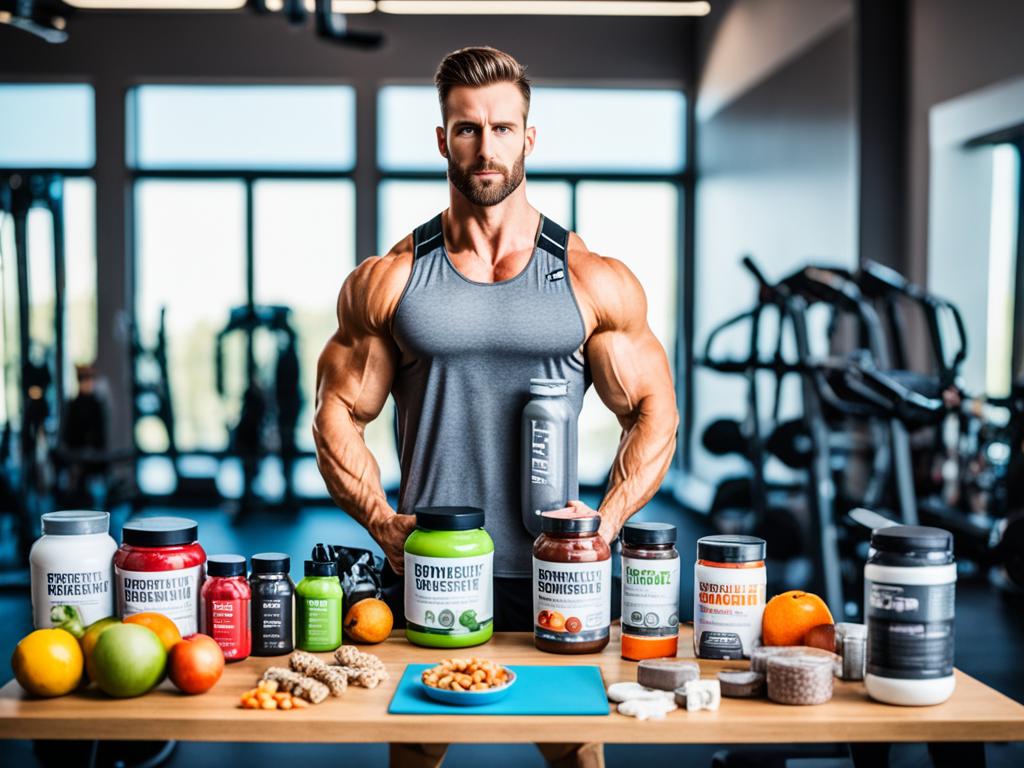
| Nutrient | Role in Pre-Workout Nutrition | Best Sources |
|---|---|---|
| Carbohydrates | Provide quick-acting energy and help maintain blood sugar levels during exercise | Whole grains, fruits, vegetables |
| Proteins | Support muscle repair and growth, and help maintain lean muscle mass | Lean meats, eggs, dairy, plant-based proteins |
| Healthy Fats | Fuel slow-burning energy and support overall health and recovery | Nuts, seeds, avocado, olive oil |
To perform your best, focus on the right timing and food mix before your workout. This gets your body ready and fueled for top performance during your training or event.
Post-Workout Nutrition: Replenishing and Recovering
Athletes give their all in intense workouts and competitions. So, post-workout nutrition is key for them. It helps muscles repair, refuel glycogen stores, and supports recovery, boosting performance.
The Importance of Post-Workout Refueling
After a tough workout, your body needs help. Glycogen is low, and muscles need fixing. Eating right after is vital to recover and get ready for the next challenge. A mix of carbs, proteins, and nutrients starts the recovery and fills what the body needs.
Nutrient Timing for Optimal Recovery
Timing is everything after a workout, with the best chance in the first 30-60 min. This is when the body is ready to absorb what it needs. Post-workout nutrition for athletes at this time is great for fixing muscles, refilling glycogen, and recovering overall.
Choosing the right nutrition and timing boosts recovery. It ensures athletes rebuild well for their next effort. This method is a key part of a full sports nutrition plan.
Supplements for Athletes: Do They Work?
Athletes often look for ways to boost their performance. The idea of using sports supplements can be very appealing. But, do these supplements actually work? This part aims to examine the facts about popular sports supplements. It helps athletes know if adding these to their diets and training plans is a good choice.
Evaluating the Evidence on Common Sports Supplements
The sports supplement market is huge. It’s filled with products that claim to give you more energy, help you recover faster, and even make you better at your sport. Yet, the proof behind many of these claims can be unclear. Athletes should check the studies and talk to their doctors. This way, they can figure out if a supplement might help them reach their goals.
Creatine is a good example. Many studies support its use in improving strength and power during tough workouts. Caffeine, on the other hand, can help some athletes with focus and energy, but its effects differ among people. Protein supplements aid in muscle growth and recovery. Yet, the exact time to take them and the right amount changes depending on your exercise routine and diet.
With sports supplements, it’s essential to be critical and stick to info that’s proven. Learning about the research and chatting with experts is the best way for athletes to choose wisely. They can then decide if any supplements are a smart addition to their nutrition and training.
